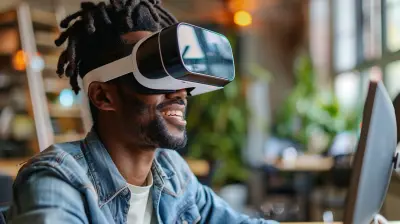AR in the Gaming Industry: Beyond Entertainment
19 July 2025
Augmented Reality (AR) has reshaped the gaming industry, taking experiences far beyond traditional screens. But AR in gaming isn't just about fun and entertainment anymore—it’s expanding its reach into education, healthcare, social interactions, and even professional training.
In this article, we'll dive deep into the evolving role of AR in gaming, its impact beyond entertainment, and what the future holds.

What is Augmented Reality (AR) in Gaming?
Before we dive into AR’s broader applications, let’s break down what AR in gaming actually means.AR overlays digital content onto the real world, enhancing how players interact with their surroundings. Unlike Virtual Reality (VR), which immerses users in a completely virtual world, AR blends digital elements with the physical environment.
Popular AR games like Pokémon GO and Minecraft Earth have shown how this technology can deliver engaging, interactive experiences using just a mobile phone.
But AR in gaming isn’t stopping at entertainment—it’s making an impact in various industries, revolutionizing the way we learn, train, and interact.

The Gaming Boom and AR’s Role in It
The gaming industry has exploded in the past decade. With billions of gamers worldwide, companies are constantly pushing the boundaries of tech to enhance engagement.Why Is AR a Game-Changer?
1. Real-World Interaction: Unlike traditional video games, AR-based games encourage players to explore their physical surroundings.2. Enhanced Social Engagement: AR can connect players in unique ways, allowing real-world and virtual interactions to blend seamlessly.
3. Immersive Experiences: AR brings gaming into everyday life. With wearables like AR glasses, the future promises even more realism.
But beyond gaming, AR’s innovations are setting the stage for real-world applications that have nothing to do with battling virtual monsters.

Beyond Entertainment: AR’s Unexpected Applications
1. Education Through Gamification
AR-powered educational games are revolutionizing learning. Platforms like Merge EDU and apps like Google Expeditions let students explore planets, dissect virtual frogs, or walk through ancient civilizations—all from their classrooms.How does this help?
- Engagement: Learning through interactive AR games makes education fun and engaging.
- Better Retention: Students remember concepts better when they visually see and interact with them.
- Hands-On Experience: For subjects like biology, engineering, or astronomy, AR offers immersive ways to understand complex concepts.
Imagine a history class where students can walk through ancient Rome or witness historical events through AR storytelling. That’s the future of education!
2. AR in Healthcare Training and Therapy
The medical field is leveraging AR-based gaming concepts for both training and therapy.- Medical Training: AR simulations allow healthcare professionals to practice surgeries and complex procedures in a risk-free environment.
- Physical Therapy: Patients recovering from injuries use AR-based games to make rehabilitation exercises engaging.
- Mental Health Benefits: AR games designed for anxiety or PTSD treatment offer therapeutic and immersive healing experiences.
3. AR in Professional Training & Employee Engagement
Many industries are turning to AR-based training programs inspired by gaming mechanics.- Military Training: AR games simulate real-world battlefield scenarios, helping soldiers train in safe environments.
- Corporate Training: AR gamification provides employees with interactive training modules. Companies like Walmart and Boeing use AR to train employees more effectively.
- Aviation & Engineering: Pilots and engineers can use AR to visualize complex aircraft systems before working on real machines.
By turning training into an engaging, interactive experience, AR improves skill acquisition and retention.
4. Social & Retail Experiences Through AR Gaming
The merging of AR with gaming mechanics is redefining how consumers shop and interact socially.- Retail & E-commerce: Brands are using AR-based games for customer engagement. Virtual “try before you buy” experiences allow shoppers to visualize products in their real-world space before making purchases.
- Social AR Games: Apps like Snapchat and Instagram use AR filters, many of which are gamified, making interactions more engaging.
- Location-Based AR Events: Companies are hosting large-scale AR treasure hunts and events, merging gaming with real-world activities.
This isn’t just gaming anymore—it’s an entirely new way for businesses and consumers to interact.

Challenges and Limitations of AR in Gaming
While AR is exciting and full of potential, it does face some challenges:1. Hardware Limitations
Most AR gaming experiences rely on smartphones, but true immersion requires AR glasses or headsets, which are still expensive.2. Battery & Processing Power
AR apps demand high processing power, which drains device batteries quickly. More optimized technology is needed to improve efficiency.3. Privacy & Security Concerns
Since AR games often use real-world data, location tracking and privacy issues arise. Ensuring user safety while blending virtual and physical experiences is a challenge.4. Accessibility & Inclusion
Not everyone has access to high-end AR gadgets. Developers need to create more inclusive AR experiences for different demographics and economic levels.The Future of AR in Gaming and Beyond
AR is evolving rapidly, and its influence across industries will only grow. What can we expect in the coming years?1. Smarter AR Glasses
As technology advances, lightweight AR glasses will replace smartphones for gaming and AR applications. Imagine playing your favorite AR games without holding a phone—just natural interactions through your eyewear.2. AI Integration in AR
Artificial Intelligence (AI) will make AR experiences more personalized and adaptive. AI-driven AR games could adjust to a player’s behavior, making interactions more dynamic and engaging.3. AR in the Metaverse
The metaverse is set to blend AR, VR, and AI to create immersive digital worlds that extend beyond gaming into work, socializing, and shopping. Companies like Meta (formerly Facebook) are investing heavily in AR-driven metaverse experiences.4. AR for Environmental Awareness
Expect more AR games focused on sustainability and environmental awareness. Games could encourage users to explore nature, clean up communities, or learn about climate change through immersive experiences.
Final Thoughts: AR is More Than Just a Game
AR gaming is no longer just about catching virtual creatures or playing interactive puzzles—it’s a technology shaping industries, transforming education, revolutionizing healthcare, and enhancing professional training.As AR continues to evolve, its fusion with AI, the metaverse, and emerging tech will create even more opportunities beyond entertainment. The question now isn’t whether AR will go beyond gaming—it’s just how far it will take us.
all images in this post were generated using AI tools
Category:
Augmented RealityAuthor:

Ugo Coleman
Discussion
rate this article
2 comments
Kara Lamb
Augmented reality (AR) is reshaping the gaming industry by enhancing gameplay experiences and fostering immersive interactions. Beyond entertainment, AR applications in education, training, and therapy demonstrate its potential to revolutionize various sectors, making it a transformative technology worth exploring.
November 14, 2025 at 4:40 AM

Ugo Coleman
Thank you for highlighting AR's transformative potential! Its applications in gaming and beyond truly showcase how it can enhance experiences across various fields.
Easton Miller
This article brilliantly explores the transformative potential of AR in gaming, highlighting its applications beyond entertainment. From education to training simulations, AR is reshaping how we interact with digital environments and enhancing real-world experiences.
July 22, 2025 at 4:19 AM

Ugo Coleman
Thank you for your insightful comment! I’m glad you appreciated the exploration of AR's diverse applications beyond entertainment. It truly is a fascinating technology reshaping various fields!


